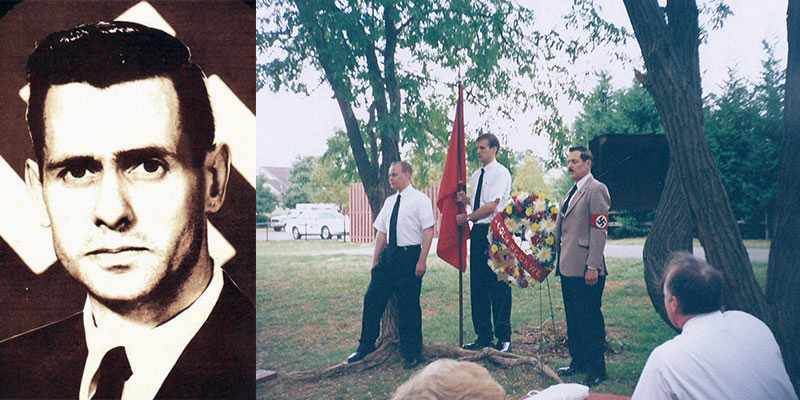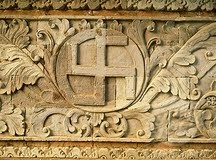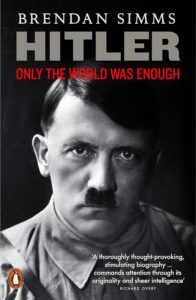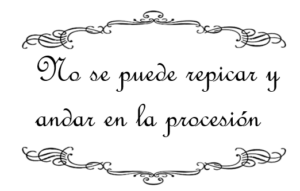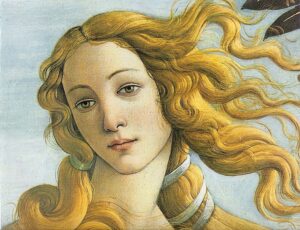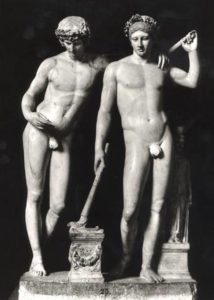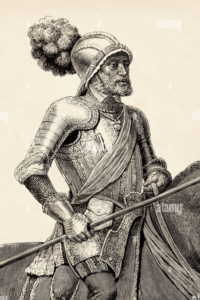by Eduardo Velasco, 3
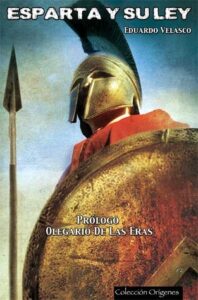
Sigfrido said:
I found the whole exposition about the controversy between matriarchy and patriarchy very interesting. Although I am not a Nazi, I quite agree with what Nordic Thunder said. The illiterate and pseudo-historical feminist had to jump in and start spouting her cretinous nonsense! Progressives and degenerates pathologise the patriarchal worldview, describing it as ‘psychopathic thinking’.
Nothing could be further from the truth. The Aryan also feels compassion, but it is pure and healthy compassion for the woman, the child and the old man who are attacked by cowardly criminals.
What he doesn’t feel is compassion for the subhuman or the degenerate; for individuals like those who killed poor Sandra Palo or Marta del Castillo—unlike the progressive or the trashy Catholic, who betray the true heroic Christianity, who gloat in the defence of the criminal and the coward.
______ 卐 ______
Editor’s interpolated note: As in the United States, in Spain the nationalist and racially conscious folk aren’t atheists but generally Christian. Following my metaphor of ‘The Wall’, it is not enough to cross it as the Germans of the last century did. It is now urgent to continue, after crossing it, to travel north to the cave under the great Weirwood tree to watch the real history of those who wrote the New Testament, and to watch also the first centuries of Christendom. This is a step that, unlike Eduardo Velasco, neither nationalist Spaniards nor nationalist Americans have dared to take!
______ 卐 ______
In The Iliad a touching scene is described between two magnificent exponents of the Aryan world (Phrygian-Trojan in one case, Achaean in the other). I refer to the scene in which Achilles pities the weeping and venerable Priam, returning to him the corpse of his son Hector.
By the way, Nordic Thunder: I found your book on Sparta very interesting. Do you plan to publish it in PDF, or better yet in paper? I know of a publisher who might be interested.
Best regards!
NT (Velasco) replies:
It is perfectly licit to feel compassion and protection towards our fellow human beings (without going any further, the dozens of whites who, every day, are raped, assaulted, murdered or robbed all over the West), while that false compassion towards degenerates, criminals or Woody Allens of life, plays against the laws of the preservation of the Species, because they are counter to natural selection and mean anti-eugenic behaviour.
Since I was a child I was deeply moved by that tremendous scene in which the noble old man Priam humbly begs the very murderer of his son to return his body to him so that he can give him a proper funeral. Achilles, who had killed hundreds of people as well as mistreated Hector’s corpse, feels his heart give way to the chilling tears of the grieving King, and fulfils his pleas with solicitude.
I’m glad you appreciated the book, colleague. I don’t know how I could convert it to PDF, but it would be interesting to do it and post it on the blog so that people could download and print it at their leisure. As for publishing it on paper, it would also be a very interesting option that I’d be perfectly willing to do. I’m all ears if you have any suggestions.[1]
Regards!
Sigfrido said:
As Stoddard said, the problem is that the criminal, the subhuman, multiplies. The dysgenic measures of the system make this aberration possible.
Since I mentioned the case of Marta del Castillo, the latest news says that the main suspect raped her and then killed her. I would beat the shit out of those bastards, and then put them on a military plane and drop them without a parachute over the Atlantic! Of course, the progressive scumbags will continue to defend the ‘human’ nature of these vermin.
NT replies:
Stoddard and so many other American, English and German eugenicists warned us that the lower classes (we are talking about a biological criterion, not an economic one, although they are related to a certain extent) are less intelligent, less healthy, less pure and with fewer resources reproduce faster than the upper classes who have a precious genetic inheritance to pass on. This is precisely due to the compassion translated into aid for the dregs of society (immigrants, pseudo-gypsies) while the social nucleus that has built these advantages doesn’t benefit from them. It is taken for granted that they must make a living without any help from this sinister anti-State.
What makes me laugh at these compassionate-Pharisee progressives is that if it was their little girl who had been outraged by a sick pig, they would be the first to stand at the front row of the trial with a muzzle on, foaming at the mouth and screaming for ‘DEATH PENALTY’.
Sigfrido said:
Eugenicists like Stoddard, Lundborg, Günther, etc., were right. The subsidies to the trash (who can’t even be described as poor, since they are lumpen) facilitate the multiplication of the biological waste, while on the other hand, the high taxes and the polluting progressive ideas make the most valuable not breed as they should.
The other day I heard that filthy, deformed, pro-green spawn, María Antonia Iglesias, viciously attacked those who demanded life imprisonment for the canis in Seville who killed Marta. She said that asking for that is ‘inhuman’. I am disgusted by these bitches who pity subhuman bipedal vermin!
I would like to take this opportunity to invite you to participate in Adecaf’s La Comunidad del Diálogo. It is a forum set up by some Catalan NRs. I disagree quite a lot with their NR ideas but they are good people, well-educated and there are also others of different ideologies, including Nazis. It’s the only real forum on the net, and nobody gets banned.
Arbmon said:
Here’s a link to a page of a chick who thinks matriarchy is cool. Ha ha. It shows the ultimate matriarchal society, where they live like primitives. [link]
NT replies:
There’s a comment posted before mine on the page you just put up. Don’t miss it:
I can’t believe it! Now I see why matriarchy never prospered. In those societies they are all a bunch of mediocrities and conformists. Only pleasures and promiscuities reign; war, ambition, sacrifice, honour, hardening and heroism are unknown. Men are cowards, very happy to be subordinates and ignore the dignity of responsibility, pampered weaklings. That’s how things would be if women ruled: a happy but rotten world.
Suevo said:
What’s your opinion of the Basque matriarchy?
NT replies:
Well, the Basque matriarchy thing is relative, because the Basques already have enough miscegenation, but they were originally a pre-Indo-European people who were indeed matriarchal. The man went to live with the woman after marriage.
I think that these sinister matriarchal-lunar reminiscences have a lot to do with modern Basque terrorism. Those pre-Indo-European ETAs are a bunch of obsessed and repressed neurotics, and the Basque problem is not a political issue, it is a racial issue.
In the Basque Country, we often have the best and the worst of the country. On the one hand, non-Aryan vestiges such as pathetic separatism and its ugly language, and on the other hand we have brave Basques who are worth their weight in gold, such as Blas de Lezo (18th century) or Josué Estébanez (the comrade who defended himself against 60 thugs in the Madrid metro).
Matriarchy is a cancer that is being revived in this era of pacifism and miscegenation. Still, it is not solved by simply eradicating it but by going to its cause, which is the mixing of blood. When a racial policy of selection makes the blood of the Aryan invaders predominate again, matriarchy will be a thing of the past.
Anonymous said:
An example of an Indigenous tribe here [Argentina and Chile] could be the Mapuche people. They are matriarchal and the Spanish and then the Criollos didn’t try to exterminate them. They are still here. I think that with the looks that they mostly tend to give to those who are not of their ethnicity, they give you the evil eye. The truth is that they are nothing like the European matriarchies, the Mapuches were warriors and in fact ‘mapuchized’ many other tribes that were patriarchal. […]
NT replies:
Well, you have simply placed a matriarchal order above no order. I place patriarchal order above matriarchal order. Both the Mapuche and the Indian tribes of the Southern Cone (and the whole of the Americas) were unevolved peoples and far inferior to the European invaders. Let’s look at examples of the matriarchy you describe [not quoted in this translation of that Spanish thread—Ed.].
I don’t give a damn about those villages. I address myself to peoples of White Race and aggressive, expansive, solar and heroic culture where courage, the Army and triumphant death are the cornerstones of existence. No wonder patriarchy prevails over matriarchy through military conquest with guns and torches in hand, while matriarchy prevails over patriarchy through miscegenation and decadence.
Fortunately, the harshness of times to come will bring about a revival of the Aryan Patriarchy.
____________
[1] Velasco’s book has been published. See the image at the top of this post. You can read our Spanish-English translation of that book here.—Ed.
